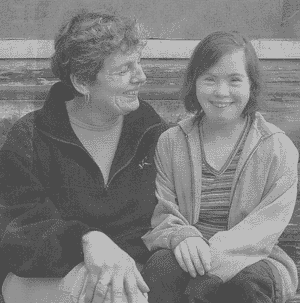


The school of soft knocks:
Does anybody really benefit when universities cut
academic corners to accommodate the disabled?
Aug. 17, 2001
|
Like every child, I dreamt of what I'd become when I grew up.
When I was three years old, my mother enrolled me in ballet
classes. Aside from growing too big, my feet never could keep
in step. So, I'm not a ballerina. Some dreams, it seems, are
realistic, some are not. Mary Stevenson has always dreamed of going to university. She'd
like to be a doctor, a nurse or a lab technician. The problem
is, she has Down syndrome. Most loving parents would assume that a developmental disability
of this type precludes university and would encourage other
dreams. But not Mary's parents. "I feel that everyone should be able to run with their
own dreams," says Barb Stevenson. "Why shouldn't Mary
go to university?" Mary's mother is not alone in encouraging such dreams. In British
Columbia, a dozen parents recently organized to promote "inclusive"
post-secondary education. Already such programs exist in universities
in Alberta and Prince Edward Island, where individuals with
mild to severe mental and developmental disabilities attend
classes and take part in varsity activities. There are no academic
or intellectual standards for admission, no attendance requirements,
no grades and no exams. "Graduates" receive their
own special diplomas—not to be confused with real ones. Inspired by the humane motives of parents, friends and academics,
efforts to fulfil such dreams are part of a larger movement
to end discrimination against people with disabilities. Awareness
of the special needs of the physically disabled was heightened
with the influx of Vietnam veterans in the 1970s. Buildings
were remodelled to provide wheelchair access, elevators were
equipped with braille lettering and crosswalks with beeping
sounds. These initiatives made sense. Then, in 1990, the U.S. Congress passed the sweeping Americans
with Disabilities Act which Senator Tom Harkin, the chief sponsor,
described as "the 20th-century Emancipation Proclamation
for people with disabilities." The effect was to expand
the terms of reference to include mental as well as physical
disabilities. If students could provide letters saying they
suffered from learning disabilities, they were to be granted
special consideration; modified assignments, exemptions from
deadlines and extended time for examination writing. This too seemed to make sense but, like many laudable ideas,
it has gone too far. A California business student afflicted with dyscalculia, the
dysfunction that prevents one from learning math, complained
after her college declined to waive a required math course.
Despite its genuine attempts to accommodate her impairment,
including extensive tutoring and extra time on tests, the college
was found responsible in that "it is discriminatory to
require the student to consume his or her time and jeopardize
his or her grade point average taking a particular mathematics
course when (it has been) determined that the student, due to
his or her disability, is highly unlikely to pass the course
..." In other words, it's OK to skip the course - and to
ignore the math skills needed to run a business. Here's a hint of just how much sillier it can get. When an
aspiring attorney, Marilyn Bartlett, who claimed to have a disability
in reading and "phonological processing" graduated
from the Vermont Law School, she petitioned the New York Board
of Law Examiners for special arrangements for her bar exams.
Specifically, she wanted unlimited time for writing the test,
access to food and drink, a private room and someone to transcribe
her answers. The board did not accept her claim of disability
and refused. After her third failure, she sued. In her ruling,
Judge Sonia Sotomayor found in Bartlett's favour, stating that
she would "have a substantial impairment in performing
(the) job" of a practising lawyer. The fact that Bartlett would have a very hard time meeting
the job requirements of a practising lawyer was, in the judge's
opinion, precisely the reason why Bartlett had a protected right
to become a practising lawyer. Her inability to pass the bar
exam was considered proof that she had a disability (at least
when compared to her classmates) and ironically, but legally,
this gave her the right to be a lawyer. Only in America, you say. Don't be so sure. A few years ago, a University of Ottawa student
successfully filed a complaint with the Ontario Human Rights
Commission claiming that the university failed to accommodate
his memory skills, which functioned differently with regards
to "names, formulas and dates." So, will Mary get to live out her dream of completing university
and working in a hospital? It could be sad for everyone, including Mary, if she did. Perhaps
we all need to take more seriously the skills and abilities
required to achieve dreams. Perhaps we need to express more
respect for those challenged by disabilities who do manage to
accomplish, in reality, more than might be expected. As a Toronto
woman, Astra Milberg, who has Down syndrome, recently said:
"To me, a dream is just a dream. When I dream, I go after
cloud nine, but I'm just daydreaming and its not reality. I
wake up from all my dreams." Oh, that we could all tell the difference. |
|
|
tanadineen.com
@ Dr.Tana
Dineen
1998-2003
by
Dr. Tana Dineen, special columnist,
The Ottawa Citizen
